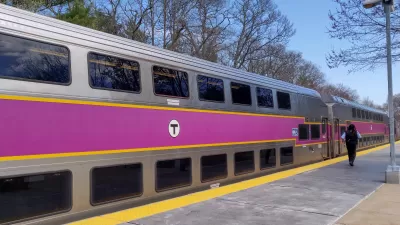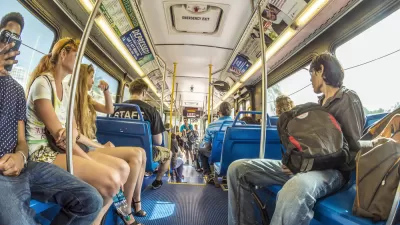Recently elected Boston mayor Michelle Wu, a bus rider herself, has the potential to be 'America's first actual climate mayor.'

Alissa Walker posits that Boston's newly elected mayor Michelle Wu, as a bus-riding, transit-friendly leader who wants to eliminate public transit fares, could be "America's first actual climate mayor."
Wu's version of the 'Green New Deal' for the city, writes Walker, "is effectively a localized, citywide pilot for the federal proposal: doubling the number of street trees, electrifying school buses, and incentivizing building retrofits, all led by a jobs program aimed at providing a just and equitable transition to a zero-emission economy that champions the city’s lowest-income workers." If Wu can meet her goals, Walker says, the city could see some transformative changes, including fare-free transit.
She’s already brought about two successful real-world examples of how this might work: a center-running dedicated lane to move buses faster than cars and a pilot project making congested routes free as a way to provide economic relief to transit-dependent Bostonians. She also wants to accelerate the rollout of Go Boston 2030, an ambitious plan meant to lay down networks of accessible sidewalks and safer bike infrastructure.
Walker is hopeful that, as an actual transit user, Wu will follow through on her bold promises and implement policies that will improve Boston's public transit and accelerate the city's progress toward its climate change goals.
FULL STORY: Michelle Wu Can Be America's First Actual Climate Mayor

Planetizen Federal Action Tracker
A weekly monitor of how Trump’s orders and actions are impacting planners and planning in America.

Chicago’s Ghost Rails
Just beneath the surface of the modern city lie the remnants of its expansive early 20th-century streetcar system.

San Antonio and Austin are Fusing Into one Massive Megaregion
The region spanning the two central Texas cities is growing fast, posing challenges for local infrastructure and water supplies.

Since Zion's Shuttles Went Electric “The Smog is Gone”
Visitors to Zion National Park can enjoy the canyon via the nation’s first fully electric park shuttle system.

Trump Distributing DOT Safety Funds at 1/10 Rate of Biden
Funds for Safe Streets and other transportation safety and equity programs are being held up by administrative reviews and conflicts with the Trump administration’s priorities.

German Cities Subsidize Taxis for Women Amid Wave of Violence
Free or low-cost taxi rides can help women navigate cities more safely, but critics say the programs don't address the root causes of violence against women.
Urban Design for Planners 1: Software Tools
This six-course series explores essential urban design concepts using open source software and equips planners with the tools they need to participate fully in the urban design process.
Planning for Universal Design
Learn the tools for implementing Universal Design in planning regulations.
planning NEXT
Appalachian Highlands Housing Partners
Mpact (founded as Rail~Volution)
City of Camden Redevelopment Agency
City of Astoria
City of Portland
City of Laramie





























